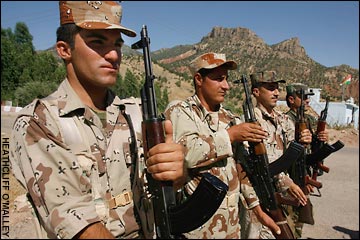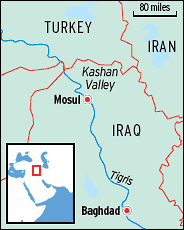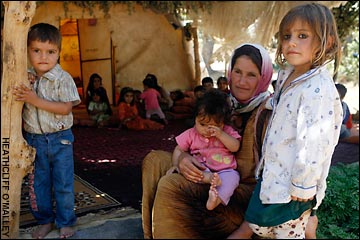
27 june 2007 | By Damien McElroy in Kashan Valley, northern Iraq
On a mountain ridge overlooking a riverside picnic spot in Kashan, Roshad Adel picked at the broken soil. Within minutes he was holding a handful of shrapnel.

Looking at the twisted pieces of metal glistening in the sun, the threads of rifling clearly visible, the 23-year-old described how his brother was hit by such a chunk of metal as the family slept in a tent nearby.
"It was midnight, we were all asleep when suddenly there was a massive boom and Dilgesh was shouting in agony. We had to rush him to hospital."
The shelling is part of an effort by Turkey to create a de facto 10-mile buffer zone inside Iraq and stop terrorists of the Kurdish independence movement, PKK, infiltrating its borders from their mountain training camps.
Turkey has mobilised more than 20,000 of its soldiers in an operation to stop the PKK using Iraq as a staging post for a new campaign of violence.

Yesterday Turkish newspapers sounded an alarm over the terrorist group after it staged an Iraqi-style suicide truck bomb attack on Turkish troops for the first time. Two men died when the fuel tanker they were driving exploded at a checkpoint in the southern Turkish province of Tunceli.
Troops have been dropped deep into Iraqi territory in violation of the country's sovereignty, but it is the hundreds of shells fired into Iraq that has most affected border residents. Anything within the zone has become fair game, with villages regularly targeted.
Jamal Othman Mohammad, a village elder, said the 70 families of Kashan village have been forced to move back from the Turkish border.w
They are living in tents while new housing is being built for them by a Christian charity. Mr Mohammad said that despite the shelling, villagers felt no animosity towards Turkey. "We are human beings like the Turkish people," he said. "We are not harming them. We want to live in peace."
While Kashan residents denied that there was a PKK presence in the area, as Turkey alleges, there were no men of working age to be seen during The Daily Telegraph's visit. At the last Kurdish army checkpoint several miles south, the commander gave us an explicit warning that we travelled on at our own risk. "From here on is PKK territory," he said. "We don't go in there much, so I can't guarantee your safety."
The Marxist terrorist group fought Turkish troops in a bitter civil war that cost 30,000 lives in the 1990s. With its leader, Abdullah Ocalan, imprisoned on an island off Istanbul, 3,500 PKK fighters took shelter in northern Iraq under the protection of the American-allied Kurdish authorities. Turkey fears that a stronger, semi-autonomous Kurdistan inside Iraq will fuel PKK attempts to unite Kurds inside its own borders.
Turkey has steadily increased pressure on Washington for American troop action against the group. But the US forces in Iraq claim their hands are tied, having passed responsibility for security in the Kurdish region to local commanders.

Joseph Ralston, a retired American air force general appointed by the White House to mediate between Turkey and the Kurds, conceded last week that America could only voice its opinion on the fate of the PKK. "I would like to see the Kurds in northern Iraq oppressing the terrorist PKK and ousting terrorists," he told Turkey's Star newspaper. "You can't indulge them. Everybody, including the US, should treat them as they are, as murderers."
But the regional government refuses to move against its brother Kurds. It refutes claims that the PKK is a rejuvenated threat to Turkey. A former British army officer, who is now an adviser to the Kurdistan regional authorities, said the Turkish military was inflaming the issue for domestic political reasons.
"The Turkish army and PKK need each other, it's symbiotic," he said. "Without the PKK, the army couldn't keep a million men under arms and without the army the PKK would wither on the vine."


